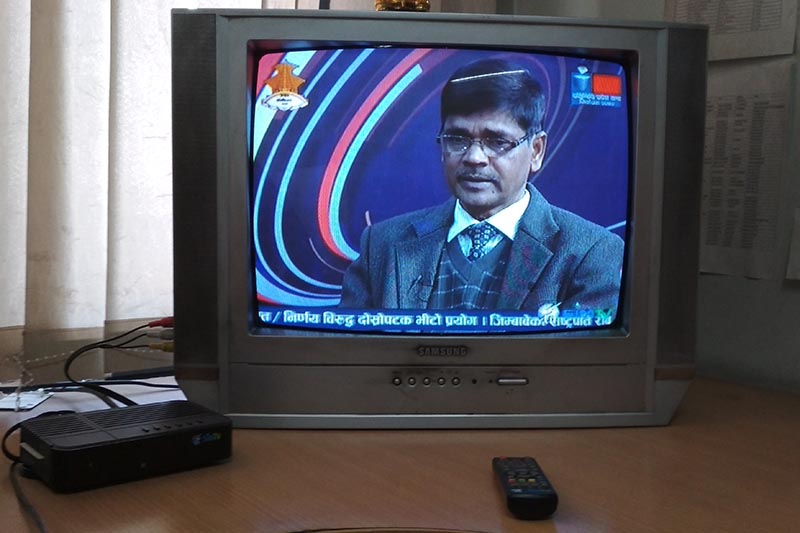Majority of channels to adopt clean feed policy in couple of weeks
KATHMANDU, NOVEMBER 2
As the government has made it mandatory for foreign TV channels to implement the clean feed policy under the Advertisement (Regulation) Act, 2019, operators and distributors of television channels in Nepal have started broadcasting foreign channels as per the policy from midnight of October 23. However, since many foreign broadcasters are still not satisfied with the policy, channels aired by such broadcasters are currently not available in the country.
“Most of the pay channels have come into operation, except for channels in the Star package.
Some channels have been unwilling to air their programmes because of the policy and have stopped their broadcasts in Nepal at present,” informed Dhruba Sharma, president of Federation of Nepal Cable Television Entrepreneurs.
He informed that all 22 channels of Sony, 12 channels of Discovery, 12 channels of Colors and 12 Zee channels have implemented the clean feed policy. “As some cable service distributors have not been able to get the equipment required for clean feed, the number of channels being screened by different service providers may vary,” Sharma added.
A total of 120 channels are not being broadcast at the moment.
These include Aastha, Sanskar, BBC, CNN, and Al Jazeera, among others.
Meanwhile, Sharma informed that it will take around 15 to 20 days more for a majority of the foreign channels to implement the clean feed rule. “We are coordinating with foreign broadcasters and we hope to convince them to abide by this policy,” he said.
Foreign channels which are being aired as per the clean feed policy are currently in the test phase owing to the setbacks in setting up the equipment, Sharma mentioned. He further informed that the foreign channels which are currently being broadcast in Nepal are approximately 95 per cent advertisement-free.
Meanwhile, Rabindra Kumar Rijal (Shashi), president of the Advertising Association of Nepal, criticised the government for not being able to implement the policy strictly. “Foreign channels are adopting the clean feed policy, but Nepali channels are still playing foreign advertisements which is against the policy and shows that we ourselves are not supporting the government in this regard,” he stated.
As per the clean feed policy, foreign channels are not allowed to air advertisements, while Nepali television channels are not allowed to play advertisements in foreign languages or even foreign advertisements that have been dubbed in Nepali. Even Nepali channels must air only domestic advertisements.
“There should be strict monitoring and channels that are not following the policy should be penalised, but the government has failed to do so,” added Rijal.
Stating that the clean feed policy has been introduced for the benefit of the country, he said that with the implementation of the policy the market of Nepal’s advertising industry which currently accounts for Rs 12 billion is likely to double in two years.
“Lately, we have been receiving more queries for advertisements and it is likely that advertising agencies could play a significant role in discouraging around 500,000 people from going abroad for job opportunities in the coming years,” Rijal shared.
Meanwhile, Sharma lamented the fact that cable television operators can only air downlink approved channels whereas consumers can also access such channels through Internet Protocol Television (IPTV) and Mobile Over-The-Top (OTT) apps — which do not have any legal provision.
“Following our concerns, the concerned authority has said that it will look into the issue but it will take several months for it to come to any concrete conclusion.
If the issue is not addressed immediately, this would certainly hamper the business of cable operators,” he mentioned.
He further said that the number of people resubscribing has dropped by 30 to 40 per cent.
There are approximately 270,000 TV users/subscribers in Nepal while there are around 250 to 300 cable television operators.
Cable operators, meanwhile, have stated that the cost of cable television service may increase by 25 to 30 per cent owing to the increased operating cost as they have to implement the clean feed policy. “Installing equipment to support the clean feed policy, placing fillers in place of advertisements, among others require an additional charge for foreign channels when they air their channels under clean feed policy in Nepal. As a result, they are likely to recoup their investment from local distributors in Nepal which later will be passed on to consumers,” said Sharma.
“To resolve this problem, we are urging the government to come up with a system that determines the charges for channel packages whereby basic packages would have certain channels and consumers could purchase additional packages as per their choice and interest,” he said.
The officials at the Ministry of Communication and Information Technology were unavailable for comment.






